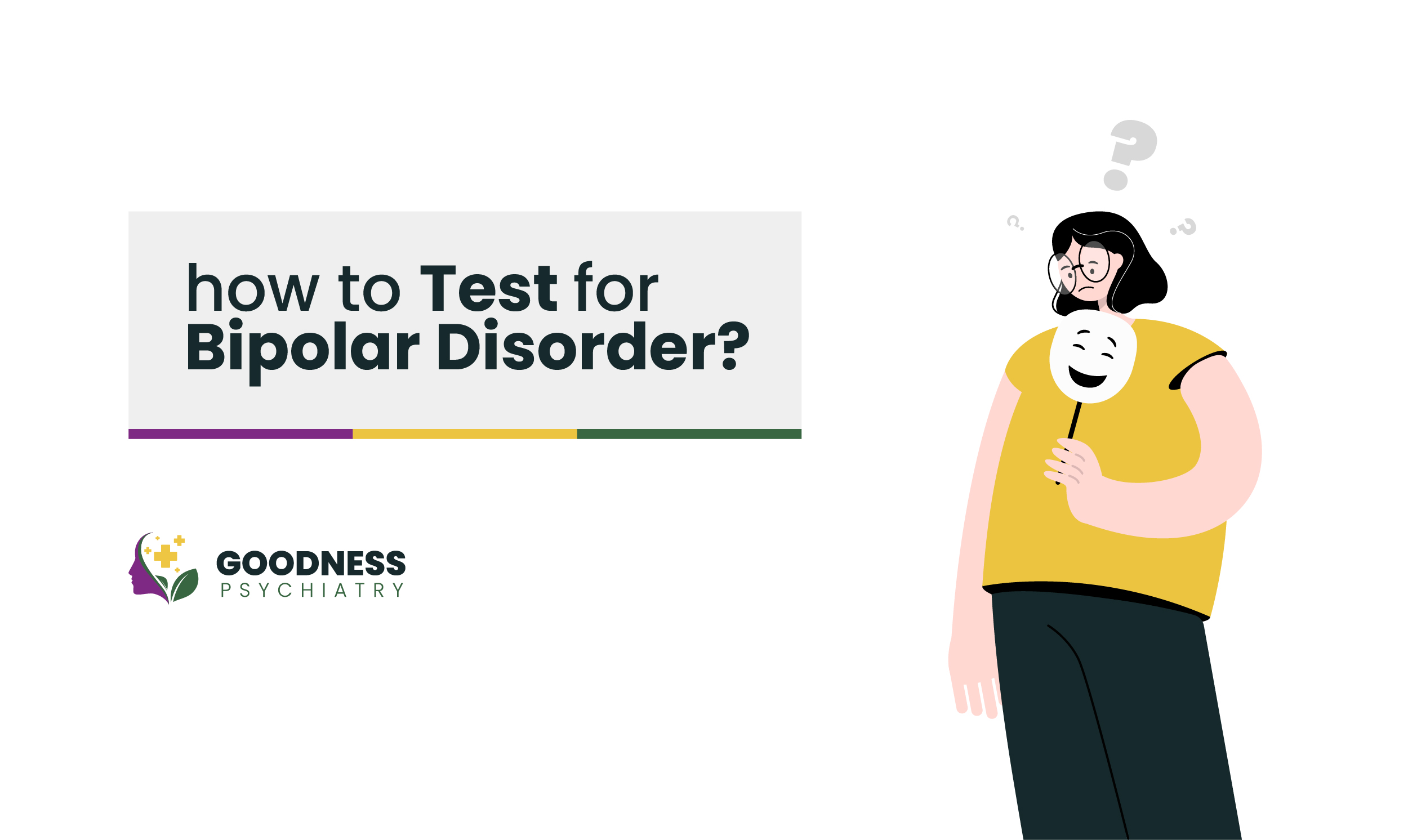People with bipolar disorder experience severe mood swings that change how they feel and act.
There are some tips and tricks that you must keep in mind while testing for bipolar disorder.
The experts might look for other issues, too.
Assembling all the information – your mood chart, discussions with doctors, checkups, and questions, is important.
This helps the mental health professional understand how to test for bipolar disorder.
A psychiatric nurse will ask you special questions listed in their book to figure out if your ups and downs are indicative of bipolar disorder.
Mood changes like these don’t happen normally. The shifts between being depressed and manic happen quickly – from hours to weeks.
Therefore, getting professional help is essential. Consider seeking assistance from Goodness Psychiatry to recover mentally.
Bipolar Explained: What It Is and Why It Matters
Bipolar disorder, also known as manic-depressive disorder.
It is a mental health condition that causes severe shifts in mood and energy levels.
A person with bipolar experiences periods of both elevated mood (mania or hypomania) and depressed mood.
Furthermore, bipolar disorder causes severe fluctuations between manic highs and depressed lows that are disruptive to one’s life and ability to function well.
Proper diagnosis and ongoing management are important for people with this condition.
How to Test for Bipolar Disorder?
Most often, you wonder, ‘Do I have bipolar disorder?’
Can there be lab tests for bipolar disorder? There are no specific lab tests that can definitively diagnose the condition.
However, physicians can order a series of tests to rule out other conditions that could be causing symptoms similar to bipolar disorder.
For bipolar disorder, some tests include:
- Complete Blood Count (CBC)
- Thyroid Function Tests
- Liver Functions Tests
- Basic Metabolic Panel
- Pregnancy Test (For Women)
- Drug/Toxicology Screen
- Vitamin/Mineral Levels
After excluding physical health issues, the focus shifts to psychological evaluation for bipolar disorder.
- Interviews with the patient and possibly family members.
- A thorough examination of the patient’s history and pattern of symptoms is conducted.
- The use of mood questionnaires and self-assessment tools can provide additional information.
- Clinicians diagnose manic, hypomanic, and depressive episodes, as well as their functional impact.
- Diagnosis is a cooperative and potentially continuous process between patient and clinician.
How Is Bipolar Diagnosed in Adults?

Proper diagnosis takes time.
It requires ruling out alternatives through a comprehensive evaluation of the person’s mental health profile over the long-term course of illness.
A mental health professional thoroughly assesses symptoms, age of onset, severity, impacts on functioning, and family history.
Keeping a diary to track mood, sleep patterns, energy levels, and thoughts over time.
DSM-5 Criteria for a Bipolar I or II diagnosis. Its symptoms must match diagnostic standards in the DSM-5 manual.
Thus, seeking evaluation from different specialists increases confidence in an accurate bipolar determination in adults.
Is There a Bipolar Test Online?
Self-assessment tests and quizzes are available online that claim to show if someone might have bipolar disorder, but use caution when reading the results.
An online bipolar disorder test isn’t meant to replace an in-depth and comprehensive assessment by a licensed mental health professional.
Among the free online tests and assessments you can access are:
- Mood Disorder Questionnaire (MDQ)
- Hypomania Checklist-32 (HCL-32)
- Bipolar Spectrum Diagnostic Scale (BSDS)
Psychotherapy For Bipolar Disorder
Bipolar disorder requires comprehensive treatment, especially psychotherapy, which provides support and strategies for coping.
Psychotherapy combined with medication can produce better outcomes for those living with the disorder.
Here are some of the main types of psychotherapy used to treat bipolar disorder:
- Cognitive behavioral therapy (CBT)
- Interpersonal and social rhythm therapy (IPSRT)
- Psychoeducation
- Family-focused therapy (FFT)
- Dialectical behavior therapy (DBT)
Bipolar Disorder Medication
Bipolar disorder can be treated with these medications:
- Mood stabilizers like lithium and anticonvulsant medications.
- Antipsychotics.
It’s essential for patients to consult their healthcare provider to find the right medication regimen for them.
In a Nutshell
How to test for bipolar disorder? The identification of bipolar disorder starts by undergoing a psychological assessment carried out by a:
- Clinical psychologist.
- Psychiatrist.
- Or another qualified mental health professional.
This assessment consists of the following:
- Person’s history.
- Symptoms and behavior.
- It often consists of a combination of clinical interviews, psychological testing, and mood questionnaires.
Bipolar disorder can sometimes mimic or exist alongside other psychological conditions, so it’s important to get a thorough evaluation.
To get more support and guidance, you can visit Goodness Psychiatry.
FAQs
How to be diagnosed with bipolar disorder?
To be diagnosed with bipolar disorder, a person must undergo an evaluation by a mental health professional, usually a psychiatrist.
How do you find out if you have bipolar disorder?
The best way to find out if you have bipolar disorder is to see a mental health professional like a psychiatrist or a clinical psychologist.
They will conduct a clinical interview about your symptoms and medical history.
Then, use the DSM-5 criteria to diagnose any underlying mood disorder properly, whether it’s bipolar, depression, or another condition.
Only a professional evaluation can provide a definitive diagnosis.
What are 5 of the main symptoms of bipolar?
List of 5 of the main symptoms of bipolar disorder include:
- Mood swings.
- Erratic behavior.
- Changes in activity levels.
- Alterations in thought processes.
- Problems with concentration.
What is the first red flag of bipolar disorder?
One of the first and most common red flags of bipolar disorder is mood swings.
Dramatic and unpredictable shifts between periods of elevated or irritable moods and depression are hallmark symptoms of the illness.
How to treat bipolar disorder without medication?
Some lifestyle and psychosocial approaches that can help treat bipolar disorder without medication:
- Sleeping and waking on a regular schedule to maintain your circadian rhythm.
- Relaxing through practices like yoga, meditation, and deep breathing – also getting social support.
- Reframing negative thoughts.
- Skills training for problem-solving.
- Knowing what triggers episodes and recognizing early warning signs of episodes.
- Communicating better, handling conflict, and gaining family support.
Is bipolar disorder genetic?
Research suggests that genetics play a big part in it.
Studies involving twins and family histories indicate a higher incidence of bipolar disorder in those with a direct relative who also has the condition.
Is bipolar a personality disorder?
No, bipolar disorder is classified as a mood disorder rather than a personality disorder.

